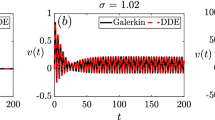Abstract
In this article, we study the initial value problem of a non-homogeneous singular linear discrete time system whose coefficients are either non-square constant matrices or square with an identically zero matrix pencil. By taking into consideration that the relevant pencil is singular, we provide necessary and sufficient conditions for existence and uniqueness of solutions. More analytically we study the conditions under which the system has unique, infinite and no solutions. Furthermore, we provide a formula for the case of the unique solution. Finally we provide some numerical examples based on a singular discrete time real dynamical system to justify our theory.
Similar content being viewed by others
References
H. Akcay, Frequency domain subspace identification of discrete-time singular power spectra. Signal Process. 92(9), 2075–2081 (2012)
S.L. Campbell, Singular systems of differential equations, vol. 1 (Pitman, San Francisco, 1980). Vol. 2 (1982)
S.L. Campbell, C.D. Meyer, N.J. Rose, Applications of the Drazin inverse to linear systems of differential equations with singular constant coefficients. SIAM J. Appl. Math. 31(3), 411–425 (1976)
S.L. Campbell, Comments on 2-D descriptor systems. Automatica 27(1), 189–192 (1991)
J. Cao, S. Zhong, Y. Hu, A descriptor system approach to robust stability of uncertain degenerate systems with discrete and distribute delays. J. Control Theory Appl. 5(4), 357–364 (2007) (English)
P. Cui, C. Zhang, H. Zhang, H. Zhao, Indefinite linear quadratic optimal control problem for singular discrete-time system with multiple input delays. Automatica 45(10), 2458–2461 (2009)
L. Dai, in Singular Control Systems, ed. by M. Thoma, A. Wyner. Lecture Notes in Control and Information Sciences, (1988)
I.K. Dassios, On stability and state feedback stabilization of singular linear matrix difference equations. Adv. Differ. Equ. 2012, 75 (2012)
I. Dassios, On non-homogeneous generalized linear discrete time systems. Circuits Syst. Signal Process. 31(5), 1699–1712 (2012)
I.K. Dassios, On a boundary value problem of a class of generalized linear discrete-time systems. Adv. Differ. Equ. 2011, 51 (2011)
I.K. Dassios, Perturbation and robust stability of autonomous singular linear matrix difference equations. Appl. Math. Comput. 218, 6912–6920 (2012)
A. Debbouche, Fractional nonlocal impulsive quasilinear multi-delay integro-differential systems. Adv. Differ. Equ. 2011, 5 (2011)
A. Debbouche, D. Baleanu, Controllability of fractional evolution nonlocal impulsive quasilinear delay integro-differential systems. Comput. Math. Appl. 62(3), 1442–1450 (2011)
A. Debbouche, D. Baleanu, R.P. Agarwal, Nonlocal nonlinear integrodifferential equations of fractional orders. Adv. Differ. Equ. 2012, 78 (2012)
R.F. Gantmacher, The Theory of Matrices I, II (Chelsea, New York, 1959)
E. Grispos, S. Giotopoulos, G. Kalogeropoulos, On generalised linear discrete-time regular delay systems. J. Inst. Math. Comput. Sci., Math. Ser. 13(2), 179–187 (2000)
E. Grispos, G. Kalogeropoulos, M. Mitrouli, On generalised linear discrete-time singular delay systems, in Proceedings of the 5th Hellenic-European Conference on Computer Mathematics and Its Applications. HERCMA 2001, September 20–22, 2001, ed. by E.A. Lipitakis (LEA, Athens, 2002), pp. 484–486. 2 volumes
E. Grispos, G. Kalogeropoulos, I. Stratis, On generalised linear discrete-time singular delay systems. J. Math. Anal. Appl. 245(2), 430–446 (2000)
E. Grispos, Singular generalised autonomous linear differential systems. Bull. Greek Math. Soc. 34, 25–43 (1992)
J.-e. Feng, P. Cui, Z. Hou, Singular linear quadratic optimal control for singular stochastic discrete-time systems. Optim. Control Appl. Methods (2012)
T. Kaczorek, General response formula for two-dimensional linear systems with variable coefficients. IEEE Trans. Autom. Control Ac-31, 278–283 (1986)
T. Kaczorek, Singular Roesser model and reduction to its canonical form. Bull. Pol. Acad. Sci., Tech. Sci. 35, 645–652 (1987)
T. Kaczorek, Equivalence of singular 2-D linear models. Bull. Polish Academy Sci., Electr. Electrotech. 37 (1989)
G.I. Kalogeropoulos, Matrix pencils and linear systems. Ph.D. Thesis, City University, London (1985)
G. Kalogeropoulos, I.G. Stratis, On generalized linear regular delay systems. J. Math. Anal. Appl. 237(2), 505–514 (1999)
N. Karcanias, G. Kalogeropoulos, Geometric theory and feedback invariants of generalized linear systems: a matrix pencil approach. Circuits Syst. Signal Process. 8(3), 375–397 (1989)
J. Klamka, Controllability of Dynamical Systems (Kluwer Academic, Dordrecht, 1991)
J. Klamka, Controllability of dynamical systems. Mat. Stosow. 50(9), 57–75 (2008)
J. Klamka, Controllability of nonlinear discrete systems. Int. J. Appl. Math. Comput. Sci. 12(2), 173–180 (2002)
J. Klamka, Controllability and minimum energy control problem of fractional discrete-time systems, in Monograph New Trends in Nanotechnology and Fractional Calculus, ed. by D. Baleanu, Z.B. Guvenc, J.A. Tenreiro Machado (Springer, New York, 2010), pp. 503–509
F.L. Lewis, A survey of linear singular systems. Circuits Syst. Signal Process. 5, 3–36 (1986)
F.L. Lewis, Recent work in singular systems, in Proc. Int. Symp. Singular systems, Atlanta, GA (1987), pp. 20–24
F.L. Lewis, A review of 2-D implicit systems. Automatica 28(2), 345–354 (1992)
H. Mejhed, N. El Houda Mejhed, A. Hmamed, Componentwise stability of the singular discrete time system using the methodology of the Drazin inverse. J. Trans. Syst. Control 4(12), 571–580 (2009)
M. Mitrouli, G. Kalogeropoulos, A compound matrix algorithm for the computation of the Smith form of a polynomial matrix. Numer. Algorithms 7(2–4), 145–159 (1994)
K. Ogata, Discrete Time Control Systems (Prentice Hall, New York, 1987)
W.J. Rugh, Linear System Theory (Prentice Hall International, London, 1996)
J.T. Sandefur, Discrete Dynamical Systems (Academic Press, San Diego, 1990)
G.W. Steward, J.G. Sun, Matrix Perturbation Theory (Oxford University Press, London, 1990)
D.N. Vizireanu, A fast, simple and accurate time-varying frequency estimation method for single-phase electric power systems. Measurement 45(5), 1331–1333 (2012)
D.N. Vizireanu, S.V. Halunga, Simple, fast and accurate eight points amplitude estimation method of sinusoidal signals for DSP based instrumentation. J. Instrum. 7(4) (2012)
W. Zhou, H. Lu, C. Duan, M. Li, Delay-dependent robust control for singular discrete-time Markovian jump systems with time-varying delay. Int. J. Robust Nonlinear Control 20(10), 1112–1128 (2010)
Acknowledgements
We are very grateful to the anonymous referees.
Author information
Authors and Affiliations
Corresponding author
Rights and permissions
About this article
Cite this article
Dassios, I., Kalogeropoulos, G. On a Non-homogeneous Singular Linear Discrete Time System with a Singular Matrix Pencil. Circuits Syst Signal Process 32, 1615–1635 (2013). https://doi.org/10.1007/s00034-012-9541-8
Received:
Revised:
Published:
Issue Date:
DOI: https://doi.org/10.1007/s00034-012-9541-8



